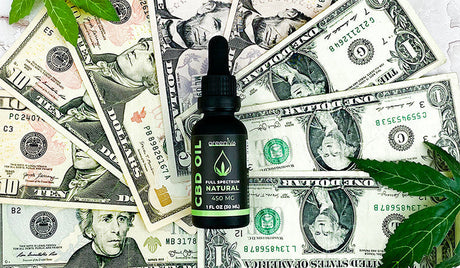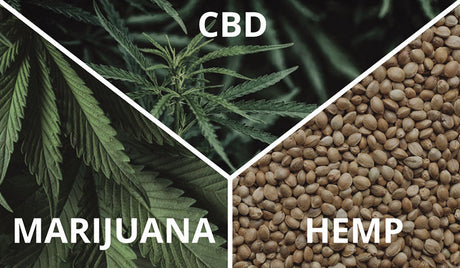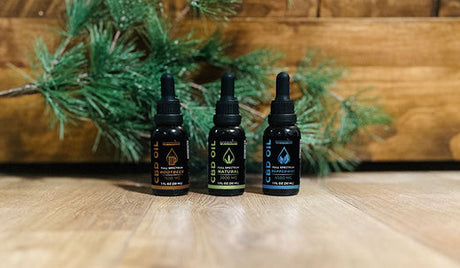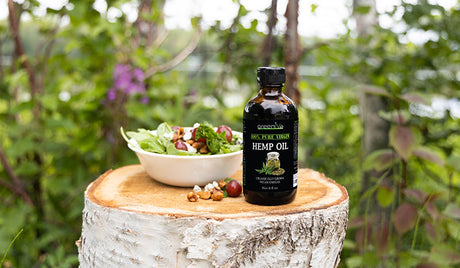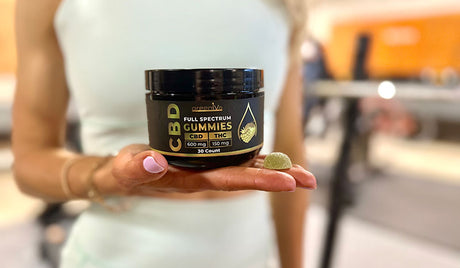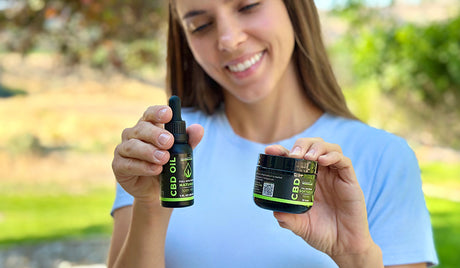The cannabis plant is a treasure trove of compounds, a complex symphony of natural elements. While some, like THC and CBD, rightfully command the spotlight, there are others like CBC oil quietly working their magic, waiting to be discovered.
If you're ready to expand your cannabinoid knowledge beyond the well-trodden paths and venture into the less explored corners of cannabis science, then you've come to the right place.
Today, we're diving deep into the fascinating world of CBC oil—a lesser-known yet increasingly promising extract with a wealth of potential. Cannabichromene, or CBC, is a non-psychoactive cannabinoid that’s been quietly garnering attention from researchers and wellness enthusiasts alike.
Forget the familiar narratives; we're here to uncover the secrets of this intriguing compound, explore its unique properties, and understand the potential impact it could have on your overall well-being. Join us as we journey into the science and possibilities of CBC oil and discover why this hidden gem might be the next big thing in natural wellness.
What Is Cannabichromene (CBC)?
What does CBC stand for? CBC stands for Cannabichromene. CBC is a non-intoxicating cannabinoid found in the cannabis plant. Each is classified as a phytocannabinoid, which means plants naturally produce it.
CBC is structurally similar to other cannabinoids like Tetrahydrocannabinol (THC) and Cannabidiol (CBD) but has its unique properties and potential benefits. CBC is present in the cannabis plant in its acidic form, known as cannabichromenic acid (CBCA).
When heated, CBCA undergoes decarboxylation, which removes the carboxyl group and converts it into CBC. We feel that it is important to note that CBC is found in relatively low concentrations in the hemp plant compared to other cannabinoids, such as THC and CBD.
How Does CBC Differ From Other Cannabinoids
CBC oil is a concentrated form of cannabichromene extracted from the cannabis plant. This oil is typically obtained from cannabis strains bred specifically to have higher CBC content. can be extracted through solvent extraction or CO2 extraction.

Like other cannabinoid oils, CBC oil can be used as a standalone product or in combination with other cannabinoids to create full-spectrum or broad-spectrum formulations. Full-spectrum oils contain a wide range of cannabinoids, including CBC, THC, CBD, and others, while broad-spectrum oils contain multiple cannabinoids but are THC-free.
CBC Oil Benefits
Although research on CBC is still in its early stages, there is growing evidence to suggest that it may offer several potential health benefits. Here are some of the areas where CBC oil shows promise:
- Discomfort: CBC interacts with the body's endocannabinoid system, which regulates discomfort. CBC can assist with discomfort by inhibiting specific signals in the brain.
- Effects on the Brain: Studies have shown that CBC may have neuroprotective properties, potentially helping the brain's overall health.
- Swelling Reduction: Studies suggest that CBC may have potent anti-inflammatory properties, potentially useful for swelling.
- Mental health support: CBC may also have positive effects on mental health. Some studies indicate that it may possess mood-related properties, offering potential relief for individuals who struggle with their mood.
These findings are promising, more extensive research is needed to fully understand the therapeutic potential of CBC oil. While more research is being conducted, there is always the potential for more benefits to be discovered.
How Does CBC Interact With The Endocannabinoid System?
CBC interacts with the endocannabinoid system (ECS), a crucial regulatory system in the body. The ECS consists of endocannabinoids, receptors, and enzymes that work together to maintain balance, a healthy immune system, and homeostasis.
CBC exhibits unique interactions with the ECS receptors, but does CBC bind with the ECS. While CBC has a low affinity for CB1 receptors, primarily found in the brain and associated with psychoactive effects. This cannabinoid shows potential as a CB2 receptor agonist.
By activating CB1 and CB2 receptors, CBC may assist in reducing inflammation found in the body. Additionally, CBC may interact with other receptors and signaling pathways within the ECS. Such as TRPA1 receptors involved in discomfort perception.
Ongoing research aims to unravel the precise mechanisms and applications of CBC's interaction with the ECS, its potential benefits for various health conditions.
CBC Oil vs. CBD Oil: What's The Difference?
When comparing CBC oil to CBD oil, it's important to understand the differences between these two cannabinoids. While both CBC and CBD are derived from the cannabis plant, they have distinct properties and effects.
Typically, CBC oil contains a higher concentration of CBC, whereas CBD oil contains higher levels of CBD. One key distinction is their interaction with cannabinoid receptors. CBC has a low affinity for CB1 receptors, meaning it has minimal psychoactive effects, while CBD does not bind directly to these receptors.
Additionally, CBC has been found to potentially act as a CB2 receptor agonist for assisting with discomfort and swelling. Conversely, CBD has a broader range of effects on various receptors and neurotransmitters in the body. CBD is also known for assisting with discomfort and swelling.

However, CBC is used more specifically for discomfort after entering the body. In contrast, the benefits of CBD for pain or discomfort may not be as potent as CBC.
Purchasing a product with both CBC and CBD would be ideal because you would get double the assistance for discomfort and swelling. Plus, when cannabinoids are introduced together, they become more potent because of the entourage effect.
While both CBC and CBD offer potential health benefits, their profiles and effects make them suitable for different purposes. Exploring the unique properties of CBC and CBD can help individuals find the cannabinoid that aligns best with their specific needs and wellness goals.
How To Use CBC Oil
CBC oil is typically available in tincture form, allowing easy sublingual administration. A few drops of the oil are placed under the tongue, which is absorbed into the bloodstream. The dosage and frequency of use may vary depending on individual needs and the concentration of CBC in the oil.
As with any cannabinoid product, it is essential to start with a low dose and gradually increase it to find the optimal dosage that works for you. It is advisable to consult with a healthcare professional before taking CBC and CBD products.
Are there any side effects of CBC? If taken in large amounts, CBC may cause conditions including dry mouth, fatigue, digestive issues, headache, and dizziness.
The Legality of CBC Oil
Since CBC oil is similar to CBD, many have questions about its legality. The Agriculture Improvement Act of 2018, or the 2018 Farm Bill, legalized hemp-derived CBD and CBD products as long as they do not contain more than 0.3% THC.
Since CBC falls under the category of CBD products, it is legal on the federal level as long as it meets the bill's requirements. However, each state and local government has its own rules and restrictions regarding CBD and CBD products.
Check those specifics before purchasing CBC or any other CBD products. Within the United States, each state has its own laws regarding CBD and CBD products, so research that as well.
Sum It Up!
In conclusion, while THC and CBD have dominated the cannabis conversation, CBC is emerging as a compelling cannabinoid with a unique profile and promising potential. From its anti-inflammatory and brain protective properties to its potential mood support effects, CBC is capturing the attention of researchers and consumers alike.
While research is still in its early stages, the evidence suggests that CBC interacts with the endocannabinoid system in distinct ways, offering benefits that may complement or differ from those of CBD. As with any cannabinoid, responsible use and talking with your doctor is essential.
As the legal landscape surrounding hemp-derived products continues to evolve, it's crucial to stay informed about local regulations and prioritize quality and transparency when choosing CBC products. With ongoing research and increased awareness, CBC will play a significant role in the future of cannabinoid-based wellness.
What CBC Products Are Best?
At GreenIVe, we understand the intricate dance between nature and wellness, which is why we’ve curated a diverse range of cannabinoid-related products, meticulously crafted to cater to your needs. You'll discover a selected amount of CBC products among our offerings.
Each is formulated with only the finest natural ingredients, ensuring a pure and natural experience. Recognizing the potential of combining cannabinoids, our CBD + CBC drops are expertly blended to amplify your recovery journey, promoting balance and well-being.
We believe in transparency and quality, which is why every product we offer undergoes a number of lab testing. This provides you with the assurance and confidence that you're receiving a safe, potent, and reliable product. We’re committed to delivering natural solutions that empower you to thrive, and our CBC products are a testament to that dedication.



